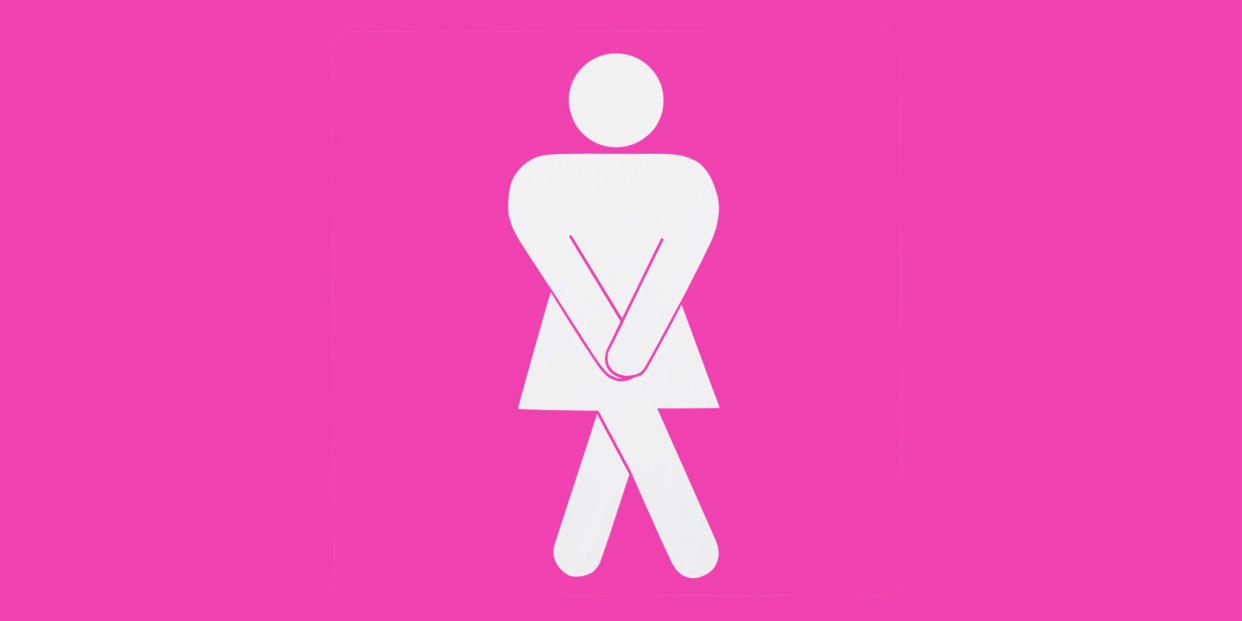4 Things That Could Happen When You Hold In Your Pee for Too Long

There's a phenomenon plaguing busy women everywhere (OK, and women who just don't feel like hitting pause on The Affair): pee procrastination. You know, the feeling that you gotta go - but then...you don't.
Whether it's because your schedule is slammed (guilty) or you're just feeling lazy (also guilty), blowing off your bladder's cue like it's some annoying guy on Tinder can have an impact on your health. "You should be urinating every four to six hours," says Lauren Streicher, M.D., an OB/GYN and associate professor of obstetrics and gynecology at Northwestern University's The Feinberg School of Medicine. "If you're always holding your pee in for too long, there are consequences."
So what are we talking about here? Exploding bladders? Higher risks of cancer? A breeding ground for UTIs? Not exactly, Streicher says. But here's what can happen if you piss away - or in this case, aren't pissing away - that feeling that you need to pee.
1. An Embarrassing Accident
Just to keep it real: Peeing your pants is a real possibility because the crossingyourlegsreallytight trick is only going to work for so long. "As your bladder gets fuller and fuller, there's a good chance you aren't going to make it to the bathroom on time," Streicher says. Imagine your bladder like a water balloon that's filling up - the longer you hold off going to the bathroom, the bigger and heavier it gets. And the muscles that contract to keep your bladder sealed can only withstand the pressure for so long before it will start to leak.
So the next time the bathroom feels like 11 steps too far away and you just can't even, think about this: Do you really want to be the grown-ass woman who just peed her pants because she didn't feel like prying herself away from her deadline? It may not be a super scary medical condition, but still.
2. Your Pelvic Floor Might Get Weak
When you force your bladder to constantly carry around a bowling ball's worth of pee for hours, the muscles in your pelvic floor start to lose strength. "Pelvic floor muscles contract in a coordinated fashion to help you either release pee or hold it," Streicher says. "But if you're continually holding urine, you can end up with some real dysfunction of your pelvic floor muscles." Over time, that can cause you to lose control of your bladder functions.
Don't freak out if you feel the urge to go and your boss pulls you into her office for a quick brainstorming session when you were about to jet to the ladies' room, or if you're on a road trip and it's an eternity till the next rest stop. "There's a big difference between someone who holds it once in a blue moon and someone who does it all the time," Streicher says. "Every now and then isn't going to cause huge problems."
3. Long-Lasting Pain
That feeling you get after you've been holding it forever and finally go? Sweet relief - but maybe not. If it's been too long, you may continue to hurt. "Once the pain signals have been trigged in the lower abdomen, the pain may not just go away," Streicher says. "Your muscles are clenching and are almost in a spasm, so they're not able to just relax."
And the pain may last for days. "I see a lot of people who come in with lower abdominal pain and think that something is seriously wrong, and one of the things I look for is does the person have normal bladder habits," Streicher says. "And a lot of times, they don't. Well, that causes pain that may stick around for awhile."
4. Your Bladder Might Get Stretched Out
As mentioned above, your bladder is (thankfully) not going to blow up, but it's certainly going to get stretched to its limits. One of the big side effects of an overextended bladder? Your body may start missing cues that your bladder needs emptied, and those messages your brain sends to your body that it needs to go to the bathroom are important (for obvious reasons).
But wait - before you start bolting to the bathroom every time you feel a pang to pee, know that "you don't have to urinate the minute you feel the urge to go," Streicher says. "A good measure is that it should never get to the point that you're uncomfortable. Holding it to that point is too long."
Follow Redbook on Facebook.
You Might Also Like


